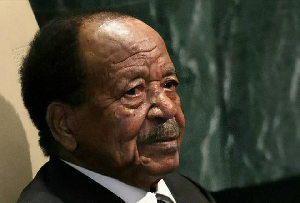"Do not fall for it, bitter kola has not been shown to treat Ebola infection", warn experts and officials.
But wait, it was tried in 1999 with some success in the lab and considered to have passed a crucial first step.
Bitter kola is already reputable for its supposed sweet benefits. It’s believed to boost sex performance in men and has been associated with the treatment of stomach ailments and fevers not only in Cameroon but across West Africa.
However, health experts and officials are warning that recent claims that the wild fruit can also cure or prevent the deadly Ebola virus hold little or no water. Bitter kola or Garcinia kola is not even one of the several Ebola treatments currently being developed or experimented.
There is so far “no proof yet” that bitter kola or any other fruit can cure Ebola, said the Nigerian minister of public health, whose country has joined the ranks of West African countries to report cases and deaths as a Ebola spreads.
“It would be wrong to place false hope in a medicine that has not at least been first studied and shown to be effective in animal models,” David Haymann of Public Health England told the BBC, as social media and news outlets spread word of an Ebola cure in bitter kola.
But the next time you receive one of those trending text messages asking you to “eat bitter kola to prevent infection” don’t spit it out in a rush. Bitter kola actually became an interest in the search for a cure for Ebola about 15 years ago.
This claim became popular in 1999, when news went around that there's a substance in the wild fruit that was “found to halt the deadly Ebola virus in its tracks in laboratory tests” according to a BBC report of that year. “If the anti-Ebola compound proves successful in animal and human trials, it will be the first medicine to successfully treat the virus that causes Ebola haemorrhagic fever – an often-fatal condition.”
“It certainly is a promising compound. So far, it’s made it through all the gates that it has been sent through,” said a virus expert at the US Army Medical Research Institute of Infectious Diseases in Fort Detrick, Maryland, John Huggins.
But human trials were never made and no drugs were produced from bitter kola.
“There is no licensed treatment or vaccine for the Ebola virus,” says Helen Briggs, a health editor at BBC. “Hospital treatment is based on giving patients intravenous fluids to stop dehydration and antibiotics to fight infections. Strict medical infection control and rapid burial are regarded as the best means of prevention.”
Several treatments are currently under study or being developed, including ZMapp – which has been administered to two Americans and TKM-Ebola, a drug developed by a Canadian firm and already tested on monkeys and a few humans.
Ebola has already killed more than 900 people, sickened about twice more and continues to spread in several West African nations, including Nigeria, Cameroon closest neighbour in the west. It is being called the deadliest outbreak of haemorrhagic fever with a death rate of 50%.
On Friday, the WHO declared the outbreak an international public health emergency “that requires an extraordinary response to stop its spread”. “Countries affected to date simply do not have the capacity to manage an outbreak of this size and complexity on their own,” said Margaret Chan at a news conference in Geneva, Switzerland.
Opinions of Monday, 11 August 2014
Auteur: Eugene Nforngwa














